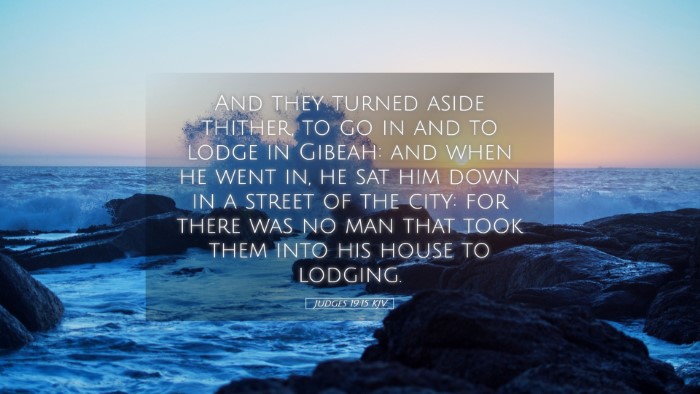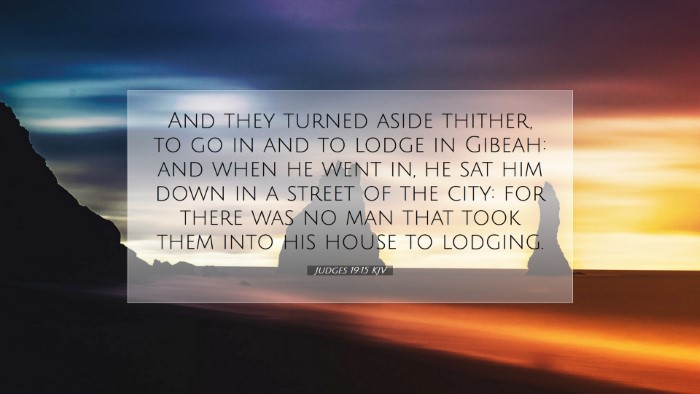Commentary on Judges 19:15
Judges 19:15 reads, "And they turned aside thither, to lodge in Gibeah: and when he went in, he sat him down in a street of the city: for there was no man that took them into his house." This verse introduces a critical episode in the Book of Judges, showcasing the social dynamics and moral decay prevalent in Israel during this period.
Contextual Analysis
In the narrative context, the focus shifts to a Levite and his concubine who are traveling from Beth-lehem to Mount Ephraim. The absence of hospitality, a vital cultural norm in ancient Israel, becomes a centerpiece in Judges 19. This situation not only reflects the historical context of tribal Israel but signifies deeper moral and spiritual implications.
Observations from Public Domain Commentaries
Matthew Henry’s Commentary
Matthew Henry emphasizes the lack of hospitality that the Levite and his concubine experienced upon their arrival in Gibeah. He notes that this lack reflects broader societal problems, indicating that "the men of Israel were become like the men of Sodom." His interpretation suggests an alarming shift away from the values prescribed in the Law of Moses.
Henry further points out the Levite's choice to 'sit in the street,' symbolizing a vulnerable position. This decision not only highlights their isolation but also serves as a critique of the community's unwillingness to extend hospitality to those in need. The collective apathy of the city serves as a sobering reminder of the descent into moral decline.
Albert Barnes’ Notes on the Bible
Albert Barnes elaborates on the historical context of the events leading up to Judges 19:15. He underlines the significance of the Levite's intention to find lodging. According to Barnes, the "inhospitality of Gibeah" sets the stage for the tragic events that follow, illustrating the dire consequences of societal neglect and moral decay.
Barnes also connects the narrative to themes of judgment and divine accountability. He notes that the refusal of hospitality not only exposes the local populace's corruption but also foreshadows the impending chaos that will unfold as a divine response to their actions. Thus, the absence of a welcoming spirit serves as a precursor to the violent events that can spoil a community.
Adam Clarke’s Commentary
Adam Clarke provides a detailed analysis of the geography and cultural practices surrounding hospitality. He notes that Gibeah, a city of Benjamites, should have been a place of refuge, reflecting the covenantal obligations of the Israelites to care for one another. Clarke’s commentary suggests that the Levite’s decision to stop there was grounded in hope and expectation for community care, which starkly contrasts with the reality he encountered.
Additionally, Clarke emphasizes the role of the Levite's concubine in this scenario. He implies that her status and the relationship dynamics represented in this moment play a crucial role in understanding the subsequent events in the narrative. The Levite's experience reveals profound lessons about societal roles, expectations, and the grim reality that sometimes those who are meant to provide security can be the very sources of danger.
Theological Implications
The passage raises several theological points worthy of discussion:
-
Theological Reflection on Hospitality: Judges 19:15 serves as a poignant reminder of the biblical imperative to offer hospitality. In light of New Testament teachings, believers are called to be welcoming and generous, embodying the love of Christ to strangers and sojourners.
-
Moral Decline and Societal Judgment: The refusal to provide shelter foreshadows the moral decay that is evident in the later chapters of Judges. This decline serves as a critical lens through which we may examine contemporary societal behaviors.
-
Divine Sovereignty and Human Agency: The unfolding events encapsulate a tension between God's sovereignty and human free will, where the people’s choices lead to tragic consequences which ultimately serve to fulfill God’s purposes in the narrative.
-
The Role of the Community: The Levite’s experience illustrates the importance of a community's moral and ethical obligations to protect and care for its members. The collective failure of Gibeah reflects a breakdown in communal responsibility.
-
Application to Current Discourse: The message from Judges 19:15 resonates with current social discussions regarding hospitality, community ethics, and the responsibility of the church to care for the marginalized and the vulnerable.
Conclusion
Judges 19:15 offers rich insights into the implications of hospitality, communal responsibility, and moral decay within the narrative of the Book of Judges. As we reflect on this passage through the collective lens of Matthew Henry, Albert Barnes, and Adam Clarke, we are challenged to evaluate our own communities and the ways in which we respond to those in need.
This verse stands not only as a historical account but also as an ethical exhortation, urging contemporary readers to embody the love of Christ through substantive acts of kindness and hospitality.


